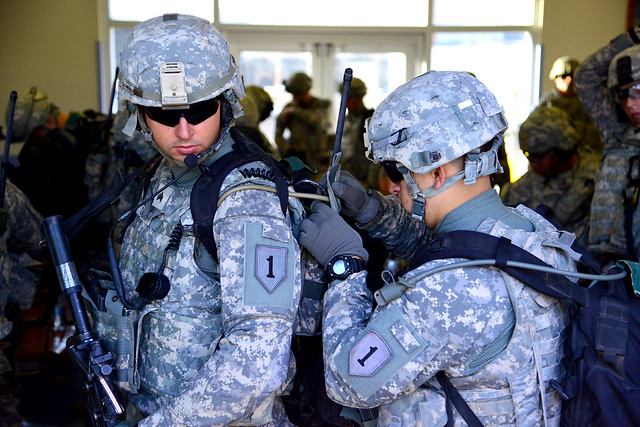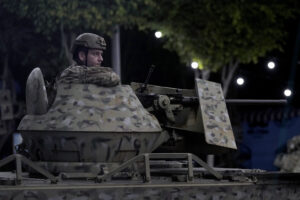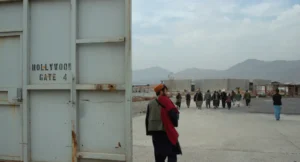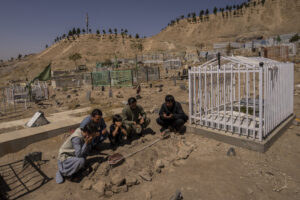Are Veterans Finally Through With Forever War?
New polling indicates that two in three now believe conflicts in Iraq and Afghanistan weren't worth fighting. Maybe it's time we listen. The U.S. Army / Flickr
The U.S. Army / Flickr
This piece originally appeared on antiwar.com.
It is undoubtedly my favorite part of every wedding. That awkward, but strangely forthright moment when the preacher asks the crowd for any objections to the couple’s marriage. No one ever objects, of course, but it’s still a raw, if tense, moment. I just love it.
I suppose we had that ubiquitous ritual in mind back in 2007 when Keith – a close buddy and fellow officer – and I crafted our own plan of objection. The setting was Baghdad, Iraq, at the start of the “surge” and the climax of the bloody civil war the U.S. invasion had unleashed. Just twenty three years old and only eighteen months out of the academy, my clique of officers had already decided the war was a mess, shouldn’t have been fought, and couldn’t be won.
Me and Keith, though, were undoubtedly the most radical. We both just hated how our squadron’s colonel would hijack the memorial ceremonies held for dead troopers – including three of my own – and use the occasion of his inescapable speech to encourage we mourners to use the latest death as a reason to “rededicate ourselves to the mission and the people of Iraq.” The whole thing was as repulsive as it was repetitive.
So it was that after a particularly depressing ceremony, perhaps our squadron’s tenth or so, that we hatched our little defiant scheme. If (or when) one of us was killed, the other promised – and this was a time and place where promises are sacred – to object, stand up, and announce to the colonel and the crowd that we’d listen to no such bullshit at this particular ceremony, not this time. “Danny didn’t believe in this absurd mission for a minute, he wouldn’t want his death to rededicate us to anything,” Keith would have said! Luckily it never came to that. We both survived, Keith left the army soon after, and I, well, toiled along until something snapped and I chose the road of public dissent. Still, I believe either of us would have actually done it – even if it did mean the end of our respective careers. That’s called brotherhood…and love.
I got to thinking on that when I read a story this week which was both disturbing, refreshing, and sickening all at the same time. A major opinion poll’s results were released which demonstrated that fully two-thirds of post 9/11 veterans now think the wars in Iraq and Afghanistan “weren’t worth fighting.” That’s a remarkable, and distressing, statistic and one that should give America’s president, legislators, media, and people as a whole, serious pause. Not that it will, mind you, but it should! It’s doubtful that US military combat vets – who are more rural, southern, and conservative than the population at large – have ever so incontrovertibly turned on a war, at least since the very end of Vietnam.
On one level I felt a sense of vindication for my longtime antiwar stances when I read about the study – in the Military Times no less. But that was just ego. Within minutes I was sad, inconsolably and completely melancholy. Because if, as a “filibuster-proof” majority of my fellow veterans (and maybe even our otherwise unhinged president) believes, the Iraq and Afghan wars weren’t worth the sacrifice, then consider the unsettling implications. It would mean, for starters, that the US flushed nearly $5.9 trillion in hard-earned taxpayer cash down the toilet. It means that 7,000 American soldiers and upwards of 244,000 foreign civilians needn’t have lost their ever precious lives. Hundreds of thousands more might not have been injured or maimed. 21 million people wouldn’t have become refugees. The world, so to speak, could’ve been a safer, better place.
Those ever-so-logical conclusions should dismay even the most apathetic American. They should make us all rather sad, but, more importantly, should inform future decisions about the use of military force, the role of America in the world, and just how much foreign policy power to turn over to presidents. Because if we, collectively, don’t learn from our country’s eighteen year, tragic saga, then this republic is, without exaggeration, finished, once and for all. Benjamin Franklin, that confounding Founding Father, wasn’t sure the American people could be trusted to “keep” the republic he and other elites formed. It’d be a devastating catastrophe to prove him right, especially in this time of rising right-wing, strongman populism in the Western world.
So consider this a plea to Congress, to the corporate media establishment, and to all of you: when even traditionally more conservative and martial military veterans raise the antiwar alarm – listen! And next time the American war drums beat, and they undoubtedly will, consider this article encouragement to do what Keith and I promised way back when. Object! Refuse to fight the next ill-advised and unethical war. Remember: to do so demonstrates brotherhood and love. Love of each other and love of country…
Danny Sjursen is a retired US Army officer and regular contributor to Antiwar.com. His work has appeared in the LA Times, The Nation, Huff Post, The Hill, Salon, Truthdig, Tom Dispatch, among other publications. He served combat tours with reconnaissance units in Iraq and Afghanistan and later taught history at his alma mater, West Point. He is the author of a memoir and critical analysis of the Iraq War, Ghostriders of Baghdad: Soldiers, Civilians, and the Myth of the Surge. Follow him on Twitter at @SkepticalVet.
Your support is crucial...As we navigate an uncertain 2025, with a new administration questioning press freedoms, the risks are clear: our ability to report freely is under threat.
Your tax-deductible donation enables us to dig deeper, delivering fearless investigative reporting and analysis that exposes the reality beneath the headlines — without compromise.
Now is the time to take action. Stand with our courageous journalists. Donate today to protect a free press, uphold democracy and uncover the stories that need to be told.







You need to be a supporter to comment.
There are currently no responses to this article.
Be the first to respond.